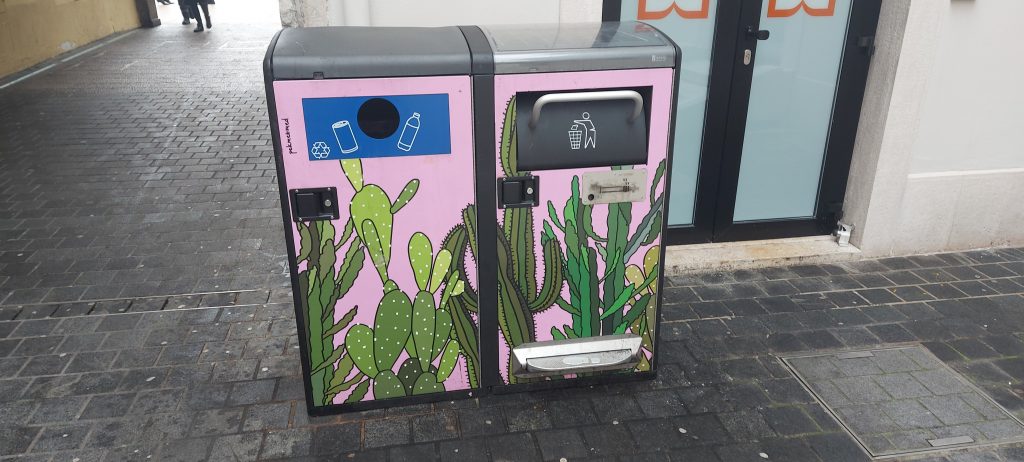Many residents of Rijeka are not aware that the waste bins painted by the works of Rijeka‘s artists, which can be found in various locations throughout the city, are actually “smart” and sustainable. Namely, depending on its type and capacity, the bins installed by the Municipal Company Čistoća Rijeka enable the collection of mixed or recyclable waste. They have a built-in sensor that measures tank‘s fullness and automatically notifies when it is ready to be discharged. Being that they are equipped with photovoltaic panels, these waste bins receive all their energy from the solar energy, therefore they can also be installed in locations where there is no additional power supply. In fact, just an hour of the solar energy enables them a month worth of work, and even an indirect sunlight is enough. In addition, smart containers have an extremely powerful press that compresses waste and allows the disposal of much larger amounts of the waste, thus reducing the collection of waste discharge.

Smart containers significantly save time, human labor, energy and reduce environmental pollution, and the so-called Smart Waste platform, which was developed by Croatian Telekom within the thematic area of the Energy & Environment Center of Competence for Smart Cities, is on a similar track. This solution in the field of smart/efficient waste management is more comprehensive and therefore a more complex solution than the smart bins solution as it brings together the final users/citizens, dispatchers of utility companies, as well as field workers and drivers of waste collection vehicles. The solution is aiming towards better waste collection management with greater business transparency and the involvement of citizens in the waste disposal process using the latest technologies.
The users of the solution will be municipal utility companies, which will use the platform to optimize the routes of utility vehicles and collect waste by type in accordance with the real needs, as well as citizens who will use the platform to facilitate the process of waste separation and disposal. The solution will fully digitize the operation for management of the processes, work tasks and resources, and will be implemented through cloud services, web and mobile applications that support office processes and field work, as well as communication with the citizens.
For citizens:
Through the mobile application, the citizens will be able to obtain information on the locations of communal yards, green islands, as well as the type of waste that is collected at a certain location with the possibility of ordering the collection of bulky waste. Through the application, the citizens will be able to submit a request for the removal of bulky waste or secondary raw materials or report an incident in the context of the waste disposal. The application provides reports on the waste collection adjusted for the public, such as personal records of the waste collection and simple reports, the possibility of contacting the municipal companies through the application, and occupancy status and volume depending on the capabilities of the tanks themselves. At the same time, the application will be used for citizens to open manholes on the waste sorting containers – the authentication will be performed in such a way that the generated QR code will be attached to the scanner, thus enabling entry to the yard.

For municipal utility dispatchers, field workers, and waste collection vehicle drivers:
In order to increase the efficiency of the waste collection process, a system to monitor and control the passage of municipal vehicles, an electronic system for visualization of waste containers, as well as a system for informing and guiding of the final users are planned.
The solutions aimed at municipal utility dispatchers, field workers, and waste collection vehicle drivers consist of a web application for utility dispatchers, which enables management and optimization of the waste collection plan, with the ability to take relevant parameters that make waste collection faster, more efficient and cheaper. They also consist of a mobile application for field workers and waste collection vehicles drivers with the opportunities to view their daily tasks, routes, and locations where the waste needs to be collected, with real-time monitoring of workers’ locations, distribution of team tasks, etc. Any system user (field worker and/or driver) will have an access to his/her list of tasks and the list of tasks of the department he/she is a part of. The scheduling display interface will provide an overview of the work tasks through the resource timeline and their rapid search by different criteria. The list with the work tasks will automatically be updated with the field data and new work assignments without a need to refresh the web application first. Thanks to the implemented GIS service, the system will display related spatial data for each work order/task, as well as data on the current location of the worker or a team, and the planned route.
The platform for creation and optimization of the daily waste collection plan and change of the plan based on the citizens′ requests and sensory data, will have the ability to quickly update the plan in real time, but also react to the current situation on the ground in order to create optimal capacity of the municipal waste fleet in the urban areas. On the other hand, the sensor data platform enables the collection of information regarding the bins and workers’ locations in real time.
Otherwise, the Smart Waste platform is a part of the Energy & Environment project, which aims to develop solutions for the improvement of energy systems and environmental monitoring systems in smart cities. It is a wish to make cities as energy-efficient as possible and more sustainable in resource management, protecting the environment and maintaining the quality of life of citizens, relying on data collected through the core platform of a smart city.



